Author Archives: Amy Stone
November 25, 2016 by Amy Stone
Ruth Gruber – Unstoppable to 105
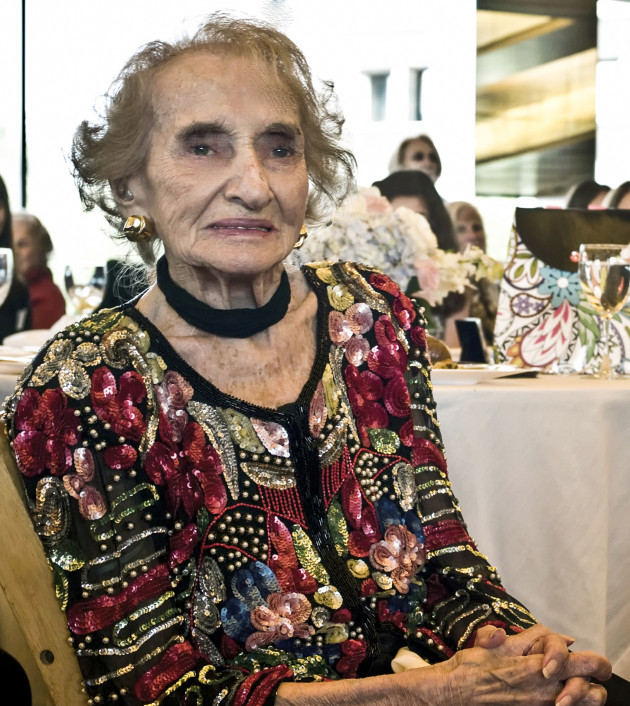
Photo of Ruth Gruber by Joan Roth
One of the last things Ruth Gruber did, slowed but unstoppable at 105, was to vote for Hillary Clinton. To observe the obvious, born in 1911, before women had the right to vote, she didn’t live long enough to see a woman president of the U.S. But she did help bend the arc of history with her camera, her words, and her passion for justice – most dramatically, by involving herself in Jewish rescue.
Ruth Gruber’s funeral, Sunday, November 20, filled B’nai Jeshurun synagogue on New York’s Upper West Side, near her long-time home on Central Park West, the twin towered, art deco Eldorado. (“El Dorado”—the legendary city of gold—seems an appropriate departure point for a fearless and adventurous woman.)
At the funeral, friends, family, and Rabbi Sally Priesand (America’s first ordained woman rabbi and the rabbi who officiated at Gruber’s second marriage) drew plenty of inspiration from Gruber’s life. In references to the current politics of fear, Gruber’s rescue of refugees was singled out as a challenge to all of us.
If this indefatigable woman had a role model, she or he went unnamed.
- 1 Comment
June 2, 2016 by Amy Stone
Shiva for Film Force Ronit Elkabetz
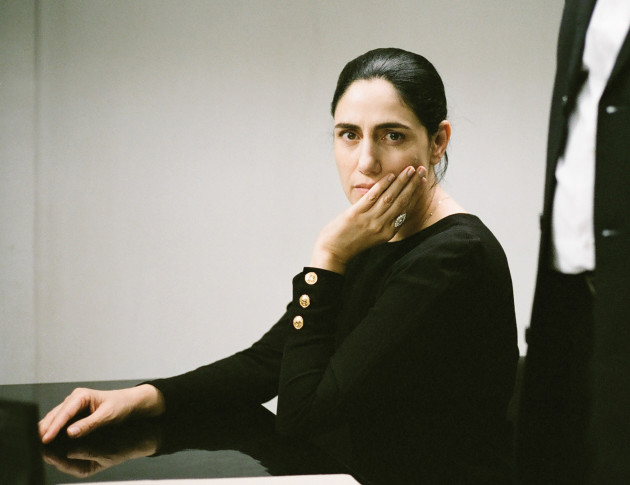
Ronit Elkabetz, Israeli film star, writer and director in her last film, “Gett: The Trial of Viviane Amsalem.”
Ronit Elkabetz is gone.
The Israeli film star, writer and director is dead at 51, from cancer that she concealed till the end. Following her death on April 19, her body lay in state at the Tel Aviv Cinamatheque, showcase for independent and controversial film.
In what turned out to be her final film, just last year Americans saw Elkabetz as the long-suffering wife in “Gett: The Trial of Viviane Amsalem.” The grinding depiction of a woman’s years’ long struggle against her unyielding husband and an Israeli religious court to grant her a gett, a writ of divorce, was the final film in the trilogy starring Elkabetz as Viviane Amsalem. Loosely based on the unhappy marriage of her Moroccan-born parents, Elkabetz co-wrote and co-directed the trilogy with her brother Shlomi, starting with “To Take a Wife” in 2004, then “Shiva” in 2008. The sister-brother collaboration was intense. As she described writing “Gett,” they’d hole up in a hotel room, cut off from the world, and create the film. On the set, they were in total sync.
“Gett,” Israel’s 2015 Oscar entry for best foreign-language film, ignited major protests in Israel, where civil marriage and divorce do not exist.
As Elkabetz told the Israeli newspaper Maariv back in 2010, “I am not here to get pleasure from acting. As much as it may sound bombastic, I would like to make a change.”
- No Comments
Feminists In Focus, The Lilith Blog
March 1, 2016 by Amy Stone
What Does a Star Do After Winning the Academy Award for Best Actress?
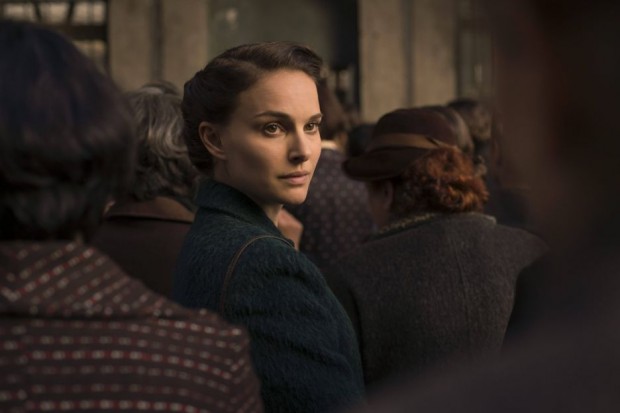
Natalie Portman in “A Tale of Love and Darkness.”
What does a star do after winning the Academy Award for Best Actress?
In a relatively short time, Natalie Portman went from her Oscar win for “Black Swan” in 2011 to starring in, directing and co-writing the film version of Amos Oz’s autobiographical novel “A Tale of Love and Darkness” (2015).
Her personal appearance, along with a crowd of paparazzi, brought a red-carpet buzz to the closing night of the 25th Anniversary New York Jewish Film Festival in January.
For those of us who track the successes for women in film, what a tour de force. Portman, who was born in Jerusalem and has dual US-Israeli citizenship, certainly did it her way. She had major control over the script, which she insisted be in Hebrew with English subtitles. She stars as Fania, Oz’s mother, who came to Mandate Palestine with romantic ideas from her privileged childhood in Poland. With a disappointing marriage in a harsh reality, she pours out her passion and gift for storytelling on young Amos.
But where were the other women filmmakers? With two weeks of films from around the world, from countries large and small, and subject matter in all shapes and sizes, I counted six female directors of feature films to nine males. Most surprising, for shorts, only three women directors to 11 men. For retrospective picks including guest selections, only one woman director (the recently deceased Chantal Akerman) to nine men. (Not to overly weight the statistics, I counted as one the male directing team of two men.) And surely the selection process is not biased against women. Aviva Weintraub, associate curator of the Jewish Museum, is the long-time director of the festival, which is presented by the Film Society of Lincoln Center and the Jewish Museum. Plus, women are well represented on the selection committee.
When I asked Weintraub if there were more women directors today than 25 years ago, she said she hadn’t counted, but probably yes. Clearly this issue is beneath the radar, even as the issue of sub-par status for women and minorities comes up regularly, dragged over the carpet at this year’s Academy Awards.
- No Comments
February 5, 2016 by Amy Stone
Warning: Miri Regev May be Harmful to Israeli Culture
 Miri Regev made page one of The New York Times. She’s the right-wing face of what The Times headlined as “Culture Wars Shift in Israel to Art Realm” (Jan. 30, 2016). Make the front page of The Times and you’re well on your way to being the Israeli that we American Jews rush to love or hate.
Miri Regev made page one of The New York Times. She’s the right-wing face of what The Times headlined as “Culture Wars Shift in Israel to Art Realm” (Jan. 30, 2016). Make the front page of The Times and you’re well on your way to being the Israeli that we American Jews rush to love or hate.
But back in November, the Other Israel Film Festival at the JCC Manhattan beat The Times to the punch at its panel “Israel’s Freedom of Speech.” Four outspoken Ha’aretz editors and reporters along with filmmaker Mor Lushi spoke critically of Regev’s chilling effect as Netanyahu’s Minister of Sport and Culture. This divisive defender of Israel approaches culture with the same zeal she brought to her brief stint as chief press and media censor for the Israeli army, followed by IDF spokesperson during Israel’s disengagement from Gaza in 2005 and the 2006 Lebanon War.
Minister of Sport and Culture since last May, Regev only joined the Likud Party in 2008, at the age of 43. She was elected to Knesset the next year, last on the Likud list of 27 candidates winning seats.
Disturbing examples of Regev’s wielding her budget for patriotic purity: She attempted to freeze funding for Haifa’s al-Midan Arab-language theater for producing a play about a Palestinian terrorist. She threatened to block state funding for the prestigious Jerusalem Film Festival unless it removed the documentary “Beyond the Fear,” on the assassin of Prime Minister Yitzhak Rabin.
- No Comments
December 28, 2015 by Amy Stone
“Rock in the Red Zone”: Living for Today in Sderot
 Not exactly a trend—but impressive—that two of the documentary directors in this past November’s Other Israel Film Festival are women who not only have several films to their credit but are also pregnant with their second child. More power to them.
Not exactly a trend—but impressive—that two of the documentary directors in this past November’s Other Israel Film Festival are women who not only have several films to their credit but are also pregnant with their second child. More power to them.
Both were featured at the 9th annual Other Israel Film Festival, which is sponsored by JCC Manhattan and focuses on films critical of Israeli politics and society. Both directors’ voices are part of their films’ message that Israel can do better.

Director Laura Bialis after the Other Israel Film Festival screening of
“Rock in the Red Zone.” She documents hard living and hot music in the town of Sderot, half a mile from Gaza. Photo by Amy Stone.
Mor Loushy’s “Censored Voices” is carefully constructed from long-silenced interviews by soldiers right after the Six-Day War. Laura Bialis’s “Rock in the Red Zone” is the more freewheeling personal and political story of a Los Angeles filmmaker, now 42, drawn to Sderot, the neglected town near enough to Gaza to be constantly under rocket attack. As a filmmaker who’s worked in Kosovo, she’s attracted to this neglected town that produces music that’s changed the Israel music scene. As she explains in the narrative, “I’d always heard that good music comes from hard places.”
She comes. She sees. She’s hooked. The film takes shape not only as the documentation of a town shamefully neglected by Israel (in the 1950s the Ashkenazi founding fathers sent the Jews from North Africa to this benighted spot, then the Ethiopians), but also as something more personal. We’re seeing the Zionist awakening of a Southern Californian. She doesn’t say it but these Mizrachi musician guys are real men, not your twerpy American Jewish males.
- No Comments
Feminists In Focus, The Lilith Blog
December 7, 2015 by Amy Stone
“Censored Voices”: Intimate Conversations with Six-Day War Soldiers in a New Film
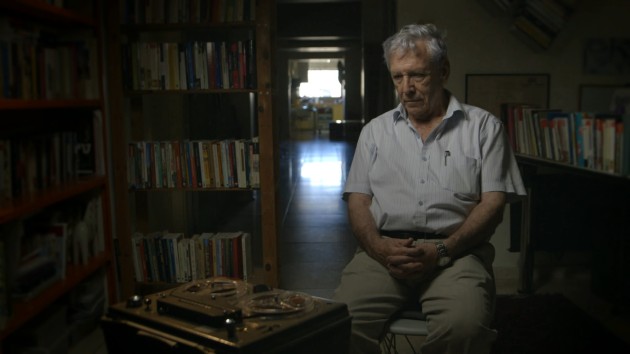
Amos Oz in “Censored Voices”
Perhaps it was her persona—a young woman utterly pure, idealistic and determined—that convinced Avraham Shapira to entrust Mor Loushy with the 200 hours of soldiers’ interviews from the Six-Day War, tapes that had remained in his closet for nearly 50 years. The tapes, sealed by the Israeli Army, hold the voices of kibbutzniks recorded immediately after the ’67 war, expressing their sadness and pain at what they felt was an uncomfortable turning point for Israel. Their voices undermine the mythic triumphalism of the Six-Day War.
Shapira and Amos Oz—the young kibbutznik who grew into the eloquent novelist— tapped into the raw anguish soldiers fresh from victory could not speak about to wives, lovers, friends. Within months, Shapira had transcribed the tapes into The Seventh Day: Soldiers Talk about the Six-Day War. The Israeli Army censored 70 percent, but even the highly redacted publication created a sensation. But gradually the reaction faded. Pride in the David vs. Goliath heroics triumphed as an essential part of the Israeli mythos.
Over the decades, Shapira was approached by those who would make the tapes public, but, in the words of Loushy, now 33, “he continued to protect the intimate conversations.”
In her 20s at the time, with only one film to her credit as director, Loushy pursued the keeper of the tapes. “I wouldn’t take no for an answer,” she said in a Skype interview from Tel Aviv. When she finally approached Shapira at a university lecture, he was ready to trust her, and invited her to his kibbutz. He handed over the tapes, giving her total freedom to create her documentary. It took her three years.
- No Comments
November 18, 2015 by Amy Stone
Sacred Rights in a Time of Terror
Barely 48 hours after the Paris reign of terror, it feels like a Jew-centric indulgence to show up for Sacred Rights Sacred Song‘s “A Concert of Concern,” billed as “a musical experience to support Israel’s modern Jewish democracy.”
But when Sunday’s New York area premiere changed course to open with full-throated, full-orchestrated ringing tones of “La Marseillaise,” tears came to my eyes. This was the right place to be—in the darkened main sanctuary of Ansche Chesed. The Upper West Side Conservative synagogue had opened its doors for this call to action to us New York Jews.
With the timing of “A Concert of Concern,” I expected an outpouring of Jews—and others—feeling the need to come together to be healed by music with a call to action for democracy. We would find strength and comfort with others to stand up against extremism in the name of religion.
So where was everybody? Barely 50 people were scattered around the dramatic darkness of the sanctuary, the bima bathed in light, two giant six-branch menorahs (symbols of the Jewish State) flanking the 18-person chorus; full orchestra below, under the baton of Cantor David Tillman, silver-haired, in black suit, small knitted yarmulke. (By their headgear you shall judge them.)

Cantor David Tillman conducts Sunday’s performance of Sacred Rights, Sacred Song’s “A Concert of Concern” at New York’s Ansche Chesed Synagogue. On stage in front of chorus, at right, Francine M. Gordon, producer and writer of lyrics and all spoken words, and guest artist Naomi Less. Photo by Amy Stone.
Sacred Rights Sacred Song (punning on “rights”) is the creation of lawyer-mother-religious activist Francine M. Gordon. She alternates between giving the facts on the ways that Israel’s Jewish democracy falls short, especially for women, and joining the chorus in music composed to inspire American Jews to push for change in Israel.
She quotes David Ben-Gurion, founding prime minister of Israel, declaring that the State of Israel “will uphold the full social and political equality of all its citizens, without distinction of race, creed or sex; will guarantee full freedom of conscience, worship, education and culture.”
- No Comments
February 11, 2015 by Amy Stone
Get Thee to “Gett”
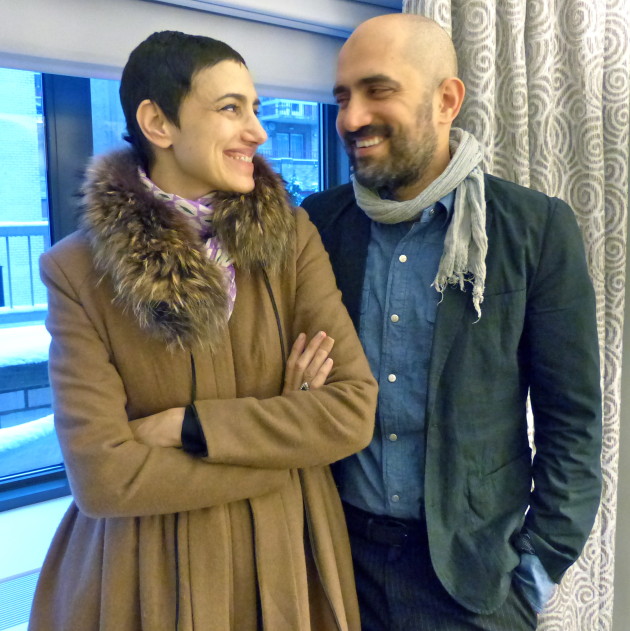
Sib filmmakers Ronit and Shlomo Elkabetz in New York before opening of “Gett: The Trial of Viviane Amsalem.” Photo by Amy Stone.
Whether you’ve dedicated your life to the plight of the chained women (Hebrew “agunot”) whose husbands refuse to give them a Jewish religious divorce (“gett”), or you had no idea that a Jewish religious divorce is the ONLY legal divorce for Jewish couples in Israel, get thee to the Israeli feature film “Gett: The Trial of Viviane Amsalem.” In Hebrew, French and Arabic with English subtitles, it opens Feb. 13 in New York City and Los Angeles.
Under Jewish religious law (not just in Israel), a husband can simply refuse to give his wife a divorce. In this remarkable film, we see in detail the final two years of excruciating legal procedures that have already dragged on for three years in an Israeli “beit din,” court of judgment.
Viviane Amsalem, the wife trapped in a dead marriage, is simply a non-person. She is beautiful. She is emotionally controlled. She is not religious, but dresses modestly (except for great sandals exposing her toes). How can she keep from cracking when she’s at the mercy of a husband who doesn’t even have to show up for court dates? When he does appear, all he has to do is say no. He doesn’t even bother to hire a lawyer.
- 1 Comment
Feminists In Focus, The Lilith Blog
January 21, 2015 by Amy Stone
New York Jewish Film Festival Opener: “The Muses of Isaac Bashevis Singer”
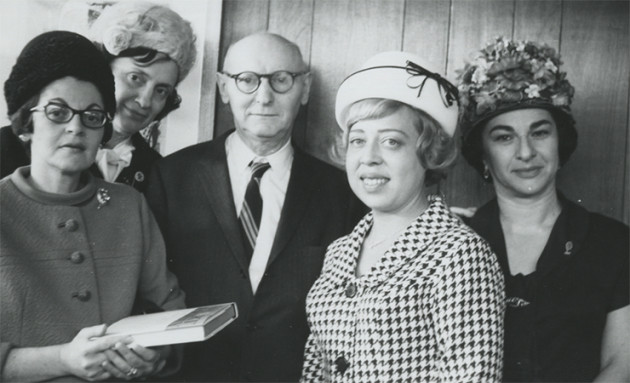 The ghost of Isaac Bashevis Singer got lucky. Two Israeli filmmakers—male – have handed the master of Yiddish tales a posthumous grand slam. He gets the first word and the last cinematic image on his definition of paradise—a harem of translators, all women.
The ghost of Isaac Bashevis Singer got lucky. Two Israeli filmmakers—male – have handed the master of Yiddish tales a posthumous grand slam. He gets the first word and the last cinematic image on his definition of paradise—a harem of translators, all women.
The U.S. premiere of “The Muses of Isaac Bashevis Singer,” the 2014 English-Yiddish-Hebrew documentary directed by Asaf Galay and Shaul Betser, opened the 24th New York Jewish Film Festival on January 14th.
Aside from his first and most famous translator, Saul Bellow (he translated “Gimpel the Fool”), and Singer’s son, seemingly all his dozens of translators were harem material.
We see footage of Singer surrounded by a bevy of young beauties asking him questions like, “Why do you write in Yiddish?” “Because I dream in Yiddish, and you should always write in the language you dream in.”
The 72-minute film brings together a seemingly endless parade of Singer’s translators. It’s a lighthearted journey to honky tonk piano and silent-movie-style scene cards in Yiddish and English.
Few of the women interviewed fault him for his sexual advances, though one, Evelyn Torton Beck, says, “I think I’m very, very lucky he never put the make on me.” (Read what she wrote for Lilith about his misogyny here.) Another translator says, “He slept with all his translators. Except me.” Could the tales of Singer’s irresistible charm have been a bit apocryphal?
- 2 Comments
January 7, 2015 by Amy Stone
A Daughter’s Take on Her Red Father
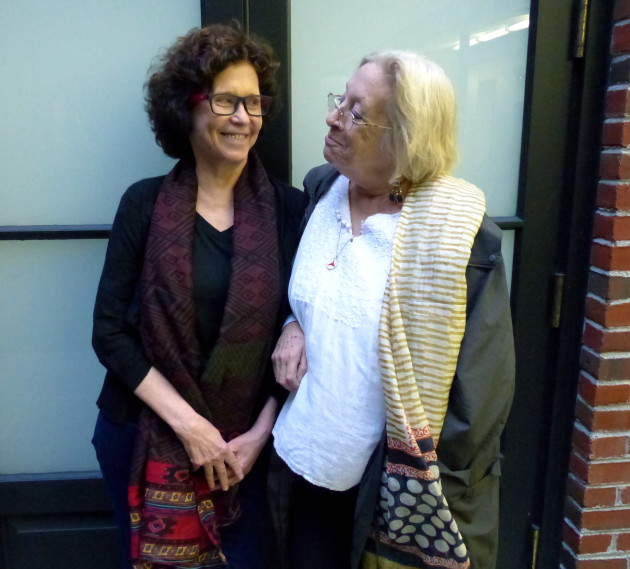
Filmmaker Tova Beck-Friedman (left) and Janet Naava Ades. Photo by Amy Stone.
“Red Father” documents the life of Bernard Ades, American Communist, with the major voice that of his daughter Janet Ades.
The son of a Russian immigrant who was the first Jew to own a bank in Baltimore, Bernard Ades was galvanized by the Depression to become a Communist. With a law degree from the University of Maryland, he joined the Communist Party’s International Labor Defense anti-lynching campaign, defending African Americans in the South. He fought in the Spanish Civil War as a member of an elite Communist cadre. Right up to his death in 1986, he remained an unflinching party loyalist, never faulting Stalin.
The 55-minute documentary by Tova Beck-Friedman is the Israeli-born sculptor’s first major film, and it’s been getting a good run at special event screenings. [See link below for future screenings.]
The many interviews with Janet Ades are buttressed with redacted FBI documents obtained through the Freedom of Information Act. Beck-Friedman brings together music and archival footage—the haunting “Strange Fruit” hanging from the poplar trees over images of lynched black men; Spanish songs, the din of warfare over Spanish Civil War footage. Just one quibble, and correct me if I’m wrong: the footage of black men laboring in the fields looks more like the deep South than the 1930s truck farms of Maryland’s Eastern Shore.
- No Comments
 Please wait...
Please wait...